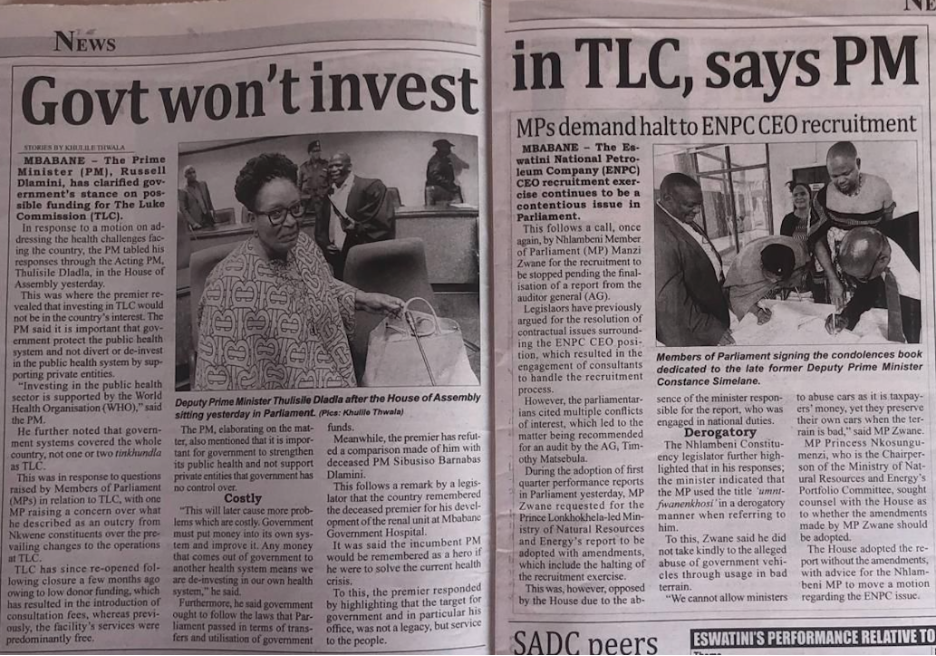TLC Clarifies Statements Made by the Prime Minister in Parliament on 24 July 2025
With deep respect for the Office of the Prime Minister, The Luke Commission (TLC) has taken time to listen, reflect, and consider our response to the remarks made by Prime Minister Russell Dlamini in Parliament on 24 July 2025, as reported in the Times of Eswatini Ono 25 July 2025. We speak now only because the health and dignity of Emaswati, and the future of Emaswati children, call for a response grounded in respect and shared responsibility.
1. WHO Strongly Supports Nonprofit Healthcare Providers
Contrary to the Prime Minister’s statements, WHO has consistently called on governments to engage nonprofit, faith-based, and other non-state actors to fill delivery gaps and ensure equitable access to care. From global strategies to Eswatini-specific policy documents, the message is clear: nonprofits are essential partners, not adversaries. (Please see Appendix 1 below for citations.)
2. TLC Has National Reach — Serving All 59 Tinkhundla
TLC’s services span the entire Kingdom of Eswatini:
520,000+ patient visits served between 2023–2025
Emaswati from all 59 Tinkhundla reached, recorded in real time, and verified through TLC’s digital health platform, Luvelo
The claim by the Prime Minister that TLC serves “only one or two Tinkhundla” is inaccurate and dismisses the healthcare realities of hundreds of thousands of Emaswati. (See Appendix 2 for maps and data visualizations.)
3. TLC Delivers High-Value, Cost-Effective Care
In the past fiscal year, TLC received E50 million in government support—7.6% of the value of care delivered. Yet TLC provided care worth over E658 million, resulting in a return on investment exceeding 12 times the public contribution. This is not only fiscal responsibility—it is national impact.
4. Parliament Approved It. The Budget Was Signed. The Process Was Followed.
The E50 million allocation to The Luke Commission for the current fiscal year was passed by Parliament and signed into law by His Majesty the King as part of the 2025–2026 national budget. The allocation was transparent, lawful, and thoroughly debated through the national budgeting process.
A Memorandum of Understanding (MoU) has been agreed upon by both the Ministry of Health and The Luke Commission. We understand it has been reviewed and approved by the Attorney General’s Office and now awaits Cabinet approval. The MoU affirms a shared commitment to accountability, coordination, and mutual respect in delivering healthcare services to Emaswati.
Given this context, recent public statements by the Prime Minister opposing the allocation raise important questions about procedural consistency. If there were concerns about the allocation, the appropriate venue for those concerns would have been during the budget approval process.
This inconsistency risks sending mixed signals to both domestic stakeholders and international partners. We respectfully call for alignment between public policy statements and budgetary decisions that have already been formally adopted through Eswatini’s constitutional process.
5. Compassion Over Competition
TLC’s mission has never been to compete with government. We believe in a future of collaboration where every sector—public, private, and nonprofit—works together to strengthen the health of Eswatini. For over 20 years, we have voluntarily responded where the need is greatest—whether through joint replacements, critical care, rural outreach, snakebite care, emergency services, digital technology advancement, among others.
We remain committed to working in good faith and appreciate the engagement of Their Majesties, Members of Parliament, Senators, Cabinet Ministers, and senior officials who have regularly visited TLC and publicly acknowledged its national impact.
6. A Call to Facts and Partnership
We urge Parliament, national leaders, and the public to focus on what truly matters: health access, equity, and national service. Let us not weaponize misinformation. Let us invest in what works for the people of Eswatini.
NB: Since November 2023, TLC has formally requested a meeting with the Prime Minister to review verified data and share evidence (such as below) in a transparent, objective setting. Multiple written requests—and direct appeals from TLC board members—have not been acknowledged or granted. Despite this, TLC remains committed to voluntarily serving Emaswati with integrity and in good faith.
Appendix 1: WHO and Global Health Policy References
WHO Global Strategy on Integrated People-Centred Health Services (2016)
“Governments should actively engage with and leverage the capacity of non-state providers to fill delivery gaps and expand equitable access.”
🔗 https://www.who.int/publications/i/item/9789241564977WHO Country Cooperation Strategy for Eswatini (2020–2025)
“WHO will support the Ministry of Health in strengthening partnerships with civil society organizations and faith-based providers to close access gaps and deliver integrated primary health services.”
🔗 https://www.who.int/publications/i/item/ccs-swz-2020-2025WHO Discussion Paper: Engaging the Private Health Sector (2020)
“Non-state actors—including NGOs, faith-based organizations, and for-profit providers—play a critical role in health service delivery. Governments should strategically engage these actors to strengthen access, quality, and equity.”
🔗 https://www.who.int/publications/i/item/9789240018327World Health Report (2010)
“Strategic purchasing and public–private partnerships are key tools governments can use to expand coverage efficiently and equitably.”
🔗 https://www.who.int/publications/i/item/9789241564021WHO/USAID/PEPFAR Faith-Based Engagement Guidance (2020)
“Faith-based health providers are often among the most trusted and accessible sources of care. Governments and donors should intentionally support and integrate these providers.”
🔗 https://www.usaid.gov/news-information/newsletter/global-health-newsletter-faith-based-partnershipsGlobal Action Plan for Healthy Lives and Well-being for All – 2023 Update
“Partnering with NGOs, civil society, and community actors is not optional. It is essential to closing service delivery gaps and achieving SDG 3.”
🔗 https://www.who.int/initiatives/sdg3-global-action-plan
Appendix 2: Service Maps and Graphs
TLC Has Served Emaswati from All 59 Tinkhundla – With Verified National Reach
Verified Data (2023–2025):
Total Patient Visits Served: 520,000+ and tracked digitally by origin Tinkhundla
Coverage: 100% of Eswatini’s 59 Tinkhundla
Data Verification: Electronic Medical Record System (Luvelo)
Please note the Top 10 Tinkhundla below by total patient visits. The full list of all 59 Tinkhundla is provided on the following page—ranging from the highest (Kwaluseni 33,110) to the lowest (Mangcongco with 1,606 visits).
Referenced Article, 25 July 2025
Contact Information
For VIPs: +268 7613 8814 / +268 7923 8814
For Media Inquiries:
Lindani Sifundza, Communications Director
📞 +268 7808 7200
📧 comms@lukecommission.org




